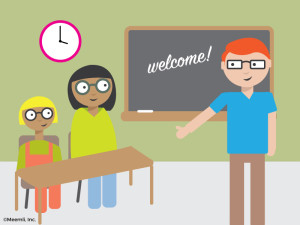Getting the Most Out of Parent Teacher Conferences
Over chocolate shakes the other day I asked my teen-aged niece what the words “parent-teacher conference” called to mind. She responded without hesitation, “No school!”
Point taken.
Many parents may think the parent teacher conferences are a chore to be endured (or avoided). Yet, with a little attitude shift, these conferences can greatly impact a student’s experience and learning at school.
Here are a few ideas to make sure your conference is a benefit to your child.
 Plan to Attend
Plan to Attend
It’s often quite a feat for parents to attend the conferences. It probably involves taking time off work, coordinating childcare, and rearranging schedules. So why bother? Here’s why:
You Build Relationships.
First of all, this is an opportunity to build a relationship with the teacher. In my experience parents often find it much easier to communicate with a teacher once contact has already been made. And honestly, teachers often find they are more comfortable calling up a parent or shooting an email to someone whom they’ve already met.
You Get to Know Your Child.
Your child’s teacher can provide valuable insights into your child’s strengths, areas of struggle, and school “personality.” I have mystified many a parent when I’ve asked them to encourage their child to speak more in class, while they thought their child was a chatterbox. Also, you can fill in the teacher about your child’s interests, behaviors, and habits at home. Teachers benefit from having a fuller picture of your child, especially in the upper grades where they often see a student’s work only in one subject.
You Learn How to Support.
Finally, conferences often give parents essential information they need to better support their children. As a teacher, not only do I give suggestions on which areas need help and how you can give it, I always have extra “goodies” on hand: a course syllabus, reading lists, helpful websites, various other handouts that may never have made it out of the black hole of a ninth grader’s backpack.
Go Prepared
I know, it sounds like homework, but conferences go fast, and a little prep ahead of time makes a world of difference. To make the most of your time, do a little thinking before hand. What do you hope to gain by attending the conference? Do you have specific concerns about your student academically or socially? Do you have a good sense of the expectations in your child’s class? Do you understand what the various assessments mean? If your child needs extra help, what can the teacher recommend?
Many conferences are including the students themselves these days, as it is all about them! If your child’s school does not include the student in the conference, talk to your child beforehand. Is there anything he finds difficult? What does he like most? What does she think her teacher will have to say about her work in class. Does she agree? Can your child articulate the expectations in the class and how grades are calculated? Just thinking through these questions will help your child, and the teacher will be able to give you the specific information you need.
Want to know more? Here’s a long list of questions that a teacher may love to answer – but your conference may not be long enough to cover them all!
Actively Participate
Growth and development are the purpose of education. Expect the teachers to cover (and ask if they don’t):
-> Your child’s strengths and the habits, abilities, and interests that help
-> Your child’s challenges and areas of growth and development
Sometimes teachers get lost in their own jargon, or forget that not everyone knows the meaning of objective 3.2.1 for 10th grade English. During one conference I remember a parent looking very confused and trying to figure out the meaning of “SWBAT” on the board. (FYI, it means “Students will be able to…”) Don’t hesitate to ask for clarification.
By the way, a heartfelt ‘thank you’ is always appreciated!
Take Action
You should leave the conference with some real, concrete next steps. Maybe it’s an email check-in next month, a new resource to pursue, helping your child become more organized, or just a conversation with your child.
Keep in mind, the most effective “next steps” are made in partnership. Most high school teachers have well over 100 students on their rolls, more typically 150. Make it as easy as possible for the teacher to be attentive to the needs of your child.
Just showing up to the conference signals your investment in your child’s academic life. Your child – and your child’s teacher – will notice. And you may notice a difference in your child’s school experiences too.
Do you have any PTC stories to share? We’d love to hear them!
